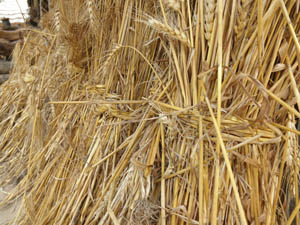World grain prices are up sharply since June. U.S. prices rose for several days ahead of the USDA’s much awaited projection of this year’s global grain harvest, issued on August 12. Excess heat cut this year’s harvest in Central Asia. Russia and the Ukraine, which are normally grain exporters, have stopped all grain exports until December. However, harvests in the U.S., Canada, Argentina, and Australia are up and should offset the Asian shortfall. World grain stocks are apt to decline slightly, and prices will be higher, but USDA analysts expect no repeat of the price extremes and shortages of 2007-2008.
Except for farmers, few people in North America have been apprehensive about crop failure for decades, and most people spend only 13-15% of their total income on food. However, in much of the world, in places like Nigeria and Viet Nam, a family may spend more than half of its income on food. There food costs and availability are a very big deal. If people are short of food or can’t buy it, governments become edgy very fast. Little creates “social unrest” faster than food shortages.
Food analysts’ worries for 2010 have eased, but concerns remain for long-term supplies. Global grain stocks have stabilized in the past decade, and one can overreact to a crop failure in one major crop area. However, worriers ponder the effects of what some call “a confluence of unfortunate events” more widespread than the crop shortfall that appears to be materializing in 2010. Area-wide shortfalls seem unavoidable, and despite the need to shorten food transportation distances, it seems a good idea to retain the capability to rapidly ship food on a global scale just to offset this.
Optimistic projections tend to be too rosy; pessimistic ones give too much weight to the latest big-scale calamity. As some point out, if we really hit a food growth limit, market forces will likely stimulate the most popular remedy for the crisis: convert less crop into animal feed, and shift to more crops for direct human consumption. In other words, eat less meat.
Reasons for longer-term concern cover over all the issues in these environmental updates: from water shortages to honeybee die-offs. Indeed one major concern is new diseases suddenly sweeping through big mono-cropped fields before we can devise countermeasures for them.
Human development like urban sprawl keeps eating up prime crop ground close to urban centers, and erosion continues to be a problem. Forests cut in areas like the Amazon increase crop ground, but tropical soil appears to be better growing jungle than growing non-native crops, which tend to wear out the nutrients in 2-3 years. Would-be entrepreneurs wind up more destructive than productive. (Old native cultures let the jungle reclaim the land for decades before returning to it.)
The effects of the green revolution have long since passed the miracle stage. Increases in per acre crop yields have slowed. So far, genetically modified crops have not produced the same dramatic increases in per acre yields as field hybrid breeding in an earlier era. In short, we humans seem unlikely to run out of food, but we are going to have to become smarter and more adaptive to avoid problems.

